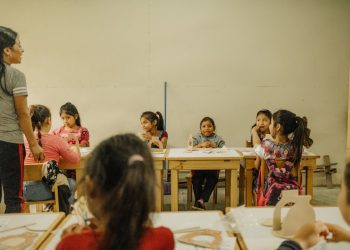No products in the cart.
Academics Push for Pedagogy Inclusion in Higher Education
Academics are calling for pedagogy to be included as a core subject in higher education, emphasizing its importance for future educators.
City, India — In a world that’s rapidly shifting towards a knowledge-based economy, the call for the inclusion of pedagogy as a core subject in higher education has never been more urgent. As universities across the globe adjust their curricula to meet the demands of the 21st century, Indian academics are taking the lead in advocating for a more structured approach to teaching methodologies.
In a recent gathering, scholars from various institutions voiced their concerns about the lack of emphasis on pedagogy within teacher training programs. They argued that while subject knowledge is paramount, understanding how to convey that knowledge effectively is equally vital. “Teaching is an art,” said Dr. Anjali Mehta, a professor of education at the University of Delhi. “But without the right techniques and strategies, even the most knowledgeable professor can fail to inspire their students.”

The push for pedagogical training isn’t just a theoretical debate; it has real-world implications. With education systems increasingly adopting technology-driven approaches, the traditional methods of teaching are being challenged. The rise of online learning, for instance, has opened new avenues for engagement but also highlighted the necessity for teachers to adapt their methods accordingly. As Dr. Rajesh Kumar, an education consultant, points out, “We are preparing our students for a future that demands flexibility and creativity. If teachers aren’t equipped with the right tools, we risk leaving a generation behind.”
The conversation around pedagogy is not limited to India. Globally, institutions are reevaluating their teaching frameworks. In Finland, for example, the educational model emphasizes collaborative learning and critical thinking, showcasing a broader understanding of pedagogy that extends beyond mere content delivery. This model has led to Finland consistently ranking among the top countries in education, a testament to the impact of well-trained educators.
Rajesh Kumar, an education consultant, points out, “We are preparing our students for a future that demands flexibility and creativity.
Critics of the current educational framework argue that many institutions prioritize research output over teaching quality. They contend that this imbalance can lead to a disconnect between academia and the real world. As a result, students may graduate with impressive degrees but lack the pedagogical skills necessary to thrive in their careers. “We need to shift our focus from just producing researchers to creating effective educators who can inspire the next generation,” said Dr. Priya Singh, a leading voice in the movement for pedagogical reform.
Moreover, the emphasis on pedagogy has implications that extend into the workplace. Employers increasingly seek candidates who possess not only subject matter expertise but also the ability to communicate and collaborate effectively. “Soft skills are becoming just as important as hard skills,” notes Mark Thompson, an HR consultant. “If universities can integrate pedagogy into their curricula, they’ll be producing graduates who are not just knowledgeable, but also capable of thriving in diverse work environments.”
The current discourse around pedagogy also intersects with broader societal trends towards inclusivity and diversity in education. Educators are recognizing the need to adapt their teaching styles to cater to diverse learning preferences and backgrounds. This shift is crucial in creating an equitable educational landscape where every student has the opportunity to succeed.
As discussions around pedagogy gain momentum, the need for policy changes becomes evident. Advocates are calling for educational authorities to recognize pedagogy as a distinct field of study that warrants its own curriculum. They argue that integrating pedagogy into teacher training programs will not only enhance teaching quality but also ultimately benefit students and society at large.
Looking ahead, the future of education may well hinge on the successful incorporation of pedagogical principles into higher education curricula. As more institutions acknowledge the value of teaching methodologies, we could witness a transformative shift in how educators are trained worldwide. As Dr. Mehta aptly puts it, “If we want to create a generation of thinkers and innovators, we must first invest in their teachers.”
This shift is crucial in creating an equitable educational landscape where every student has the opportunity to succeed.
Ultimately, the inclusion of pedagogy in higher education is not just an academic issue; it is a societal imperative. With a concerted effort from educators, policymakers, and institutions, we can pave the way for a more effective and inclusive educational system that prepares students not just for jobs, but for lifelong learning and growth.











